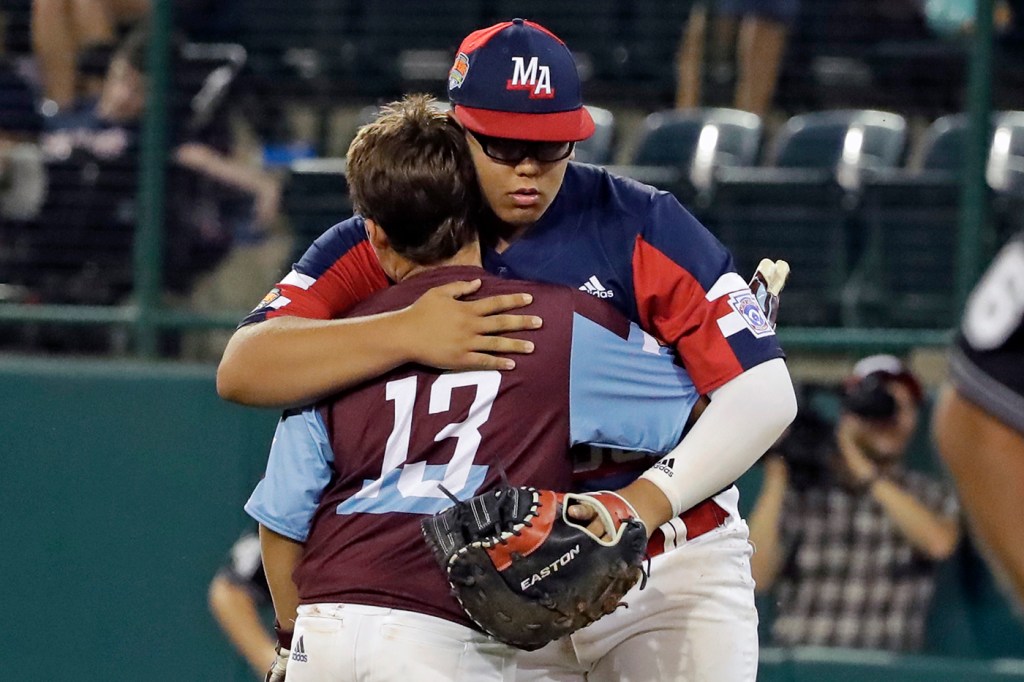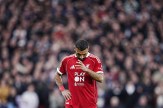Little League World Series is must-see TV, but is spotlight too bright for young players?

Frank Flynn remembers the moment he hit a home run on national television.
In the third inning of a Little League Baseball World Series game against Fort Worth, Texas, with one out, runners on first and second, and a 2-1 count, the 12-year-old from Worcester, Massachusetts, hit a 275-foot blast over the left field wall.
What followed was Flynn’s very own 15 minutes of fame. An ESPN announcer found his mother, Kim, in the crowd and interviewed her. When Flynn got back to his player dormitory in Williamsport, Pennsylvania, he was met with printouts of emails from fans. And when the team arrived home with its United States finalist banner, Massachusetts state troopers escorted the team bus to meet the thousands of people who greeted them.
The year was 2002. “Now, it’s obviously completely different,” Flynn, now a counselor at Shrewsbury High School in Shrewsbury, Massachusetts, says.
Flynn says he was “naive” at the time; aside from the emails and the packed stands, he had no idea how much attention he was really getting as a player. Now, as more and more Little League World Series games air on national television each year and moments like these are amplified on social media, it’s worth asking: Is this good for kids?
Little League broadcasting started small before it ballooned into the widespread coverage we see today. The first Little League World Series was held in 1947—this year, the tournament celebrates its 75th anniversary—and the championship game first aired on television in 1963. U.S. regional games followed on ESPN2 in 1997. Now, pre-tournament regional games air on ESPN networks following an expansion of coverage in 2019.
This year, most of the tournament games featuring 20 U.S. and international teams will air on ESPN from Wednesday, Aug. 17, through the championship game on Sunday, Aug. 28.
The athletes at this year’s World Series are the same age Flynn was in 2002—they’re all 10 to 12—but unlike Flynn and his teammates, they will be featured more heavily on TV. Then there’s social media. At a regional game last week, Texas pitcher Kaiden Shelton hit a batter in the head, then started to cry. The batter, Oklahoma’s Isaiah Jarvis, was cleared to continue play, and then, in a moment that went viral, walked to the pitcher’s mound to console Shelton.
In an interview, Shelton said that he was primarily upset that he may have injured Jarvis. “I felt really bad,” he said.
But in the same interview, Shelton also said that he was concerned about how he would be perceived and treated after the wild pitch. “I was really scared at that point because everybody was going to start hating on me,” he said.
Flynn knows how helpless it feels to have hurt a batter—he once broke a batter’s arm in Little League—and scenes like this play out on baseball diamonds across the country every day. But, for Flynn, social media has changed how these moments get broadcast, and this can amplify the impact on a young player.
“Things that happened once on TV happened, now it gets replayed,” he says. “Whether it’s a positive experience or a negative experience, you can rewind it and go back to it now.”
This can have negative consequences for children psychologically. “We create a microscope that young developing brains are not yet equipped to handle,” says Dan Lebowitz, executive director of the Center for the Study of Sport in Society at Northeastern University.
Concern for Little Leaguers who have cracked under the spotlight is not new. One Los Angeles Times reporter in 2011 called the tournament “a situation that is not meant for children.” But other changes in how youth sports are run have added stressors to young players in recent years.
“Youth sport has moved from a recreational activity to an industrial complex,” Lebowitz says.
Kids are scouted for sports as young as the second grade, he says, and children can be encouraged to specialize in one sport at an early age. This has detrimental effects, Lebowitz says.
“The professionalization of sport in my mind has unrelentingly seeped into the whole of youth sport, and created a fervent and psychologically fraught landscape of unrealistic expectations, inordinate pressure, misguided and domineering parents, coach abuse, and trauma,” he says.
Laurie Kramer, professor of applied psychology at Northeastern’s Bouve College of Health Sciences, is concerned over how much pressure this can put on young baseball players, even before they’re shown on national TV. The hours of training, travel, money spent, and family sacrifices mean the children have invested a lot to get to where they are.
“So it becomes a lot more than just being good at baseball and having a great time while you’re doing something at a really high level,” she says.
At its worst, she says, this type of pressure can cause stress and signs of depression and anxiety, or can exacerbate symptoms for children who were already at risk for psychological issues. They may also be deprived of valuable life experiences by spending so much time on one sport.
Is it unethical, then, for the media to cover the Little League Baseball World Series so broadly?
Not necessarily, says Chuck Fountain, professor emeritus at Northeastern’s College of Arts, Media and Design. “I don’t think there’s necessarily anything wrong with that if we can keep it in perspective. To give young kids a moment in the sun is, I think, kind of wonderful,” he says.
The bigger question, he says, is what to focus on as a journalist. At the professional level, it wouldn’t be untoward to linger a camera on an emotional athlete. But with a youth event, “I would hope you would get some pause in showing a child’s pain and thus making that pain more enduring than it might otherwise be,” he says.
Little League is aware of the pressure the tournament places on young athletes. In the Frequently Asked Questions section on the Little League website, in answer to the question, “Does Little League worry about the additional pressure and spotlight placed on these Little Leaguers?” the site reads, “Little Leaguers throughout the world cherish playing the game they love with their friends, classmates, and neighbors, and they dream of experiencing that on the grandest stage.”
According to the website, Little League has teamed up with DotCom Therapy to support athletes. The kids also take advantage of bubbles away from the media, The Washington Post reports, and members of the media aren’t allowed to interview athletes without an adult present.
However, looking forward, “we can all do better, as parents, as coaches, in thinking about children’s relationship with sports, and competitive sports, and thinking carefully about whether children are ready for that degree of competition is really important,” Kramer says.
There are, of course, positives to participating in the World Series, as well, including what Kramer calls “the cool factor.” Lebowitz notes that Little League can teach kids valuable life lessons such as teamwork.
What’s more, Fountain says, people love it. “Watching it is going to bring a lot of joy to a lot of people,” he says. “There is an innocence and purity to it, of kids having fun playing a game.”
When Flynn is reminded of his home run, “I can replay it in my mind,” he says. Of course, now he doesn’t have to, since someone with a VHS recording of the game posted it on YouTube.
Sometimes, Flynn and his friends watch it. It reminds him of “a great time in life,” when he got to travel, hang out with his friends, and go to pool parties, while also playing a game he loved.
“Not a lot of kids get to experience that,” he says.
For media inquiries, please contact media@northeastern.edu.






